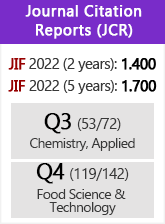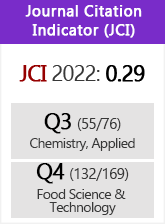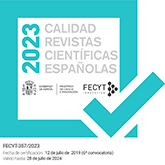Kinetic study of anaerobic digestion process of olive mill wastewater in the mesophilic and thermophilic ranges of temperature
DOI:
https://doi.org/10.3989/gya.1992.v43.i6.1130Keywords:
Anaerobic digestion, Kinetics, Mesophilic process, Olive mill wastewater, Thermophilic processAbstract
A kinetic study of anaerobic digestion of olive mill wastewater in the mesophilic (from 30ºC to 40°C) and thermophilic (from 50ºC to 60ºC) ranges of temperature has been carried out. Two reactors containing suspended biomass were used. The Chen-Hashimoto substrate utilization kinetic model has been applied, obtaining the values of the maximum specific growth rate of microorganisms, μmax,. and the kinetic constant, K, for each case studied. The obtained results showed an increase of 55% and 34% for μmax and K, respectively, of the thermophilic anaerobic digestion process in relation to the mesophilic process. The substrate utilization maximum rate value was reached for the hydraulic retention times of 7,7 and 11,6 days, for the thermophilic and mesophilic processes, respectively.
Downloads
Download data is not yet available.
Downloads
Published
1992-12-30
How to Cite
1.
Borja Padilla R, Martín Martín A, Durán Barrantes MM, Maestro Durán R. Kinetic study of anaerobic digestion process of olive mill wastewater in the mesophilic and thermophilic ranges of temperature. Grasas aceites [Internet]. 1992Dec.30 [cited 2024Jul.27];43(6):341-6. Available from: https://grasasyaceites.revistas.csic.es/index.php/grasasyaceites/article/view/1130
Issue
Section
Research
License
Copyright (c) 1992 Consejo Superior de Investigaciones Científicas (CSIC)

This work is licensed under a Creative Commons Attribution 4.0 International License.
© CSIC. Manuscripts published in both the printed and online versions of this Journal are the property of Consejo Superior de Investigaciones Científicas, and quoting this source is a requirement for any partial or full reproduction.All contents of this electronic edition, except where otherwise noted, are distributed under a “Creative Commons Attribution 4.0 International” (CC BY 4.0) License. You may read here the basic information and the legal text of the license. The indication of the CC BY 4.0 License must be expressly stated in this way when necessary.
Self-archiving in repositories, personal webpages or similar, of any version other than the published by the Editor, is not allowed.
















